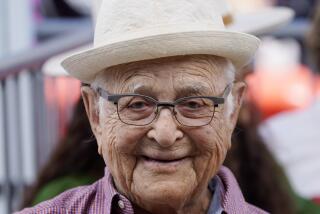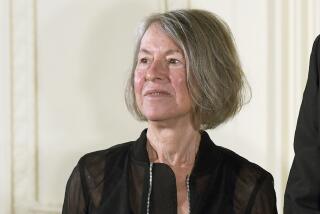Janet Lewis, 99; Novelist, Poet, Opera Librettist
Janet Lewis, a writer whose stature in the world of poetry far exceeded her general public recognition, has died at the age of 99, members of her family said.
Lewis died Tusday at her home in the Bay Area city of Los Altos.
Of her poetry, much of which was collected in “Poems Old and New 1918-1979,” critic Kenneth Rexroth once said that she “uses reason to veil and adorn the flesh of feeling and intuition. This is the way the greatest poetry has always been written.”
The poet Timothy Steele wrote some years ago in The Times that “the excellence of [her] work results partly from the simple fact that she writes very well.” He added that she had “a style that combines clear speech with distinctive and personal inflection and perception.”
A leader of the University of Chicago school of imagists in 1918, Lewis went on to a career that spanned the century. She wrote five novels, numerous volumes of poetry, children’s books and six librettos for opera.
Many would consider that a small output for her years, but Lewis was also concerned with the art of living. She once said that the poet should be “immersed” in living. In that vein, she raised two children and was devoted to her husband, poet and critic Yvor Winters.
She said women of large literary output like Willa Cather tended not to have children.
“It’s a question of what you want to do with your life,” Lewis said in explaining her priorities, but added: “Being a writer has meant nearly everything to me beyond my marriage and children.”
Lewis was born outside the Chicago area in 1899 and attended high school in the suburb of Oak Park, where she and classmate Ernest Hemingway contributed literary works to the campus magazine. She credited her father, an English professor, with being the first to teach her the rudiments of good prose and poetic style.
She went on to the University of Chicago in 1918 and joined the school’s prestigious Poetry Club. Through that group she met other young writers, such as William Carlos Williams, Marianne Moore and Winters, whom she married in 1926.
After college, Lewis lived and worked in Paris but was diagnosed with tuberculosis in 1922. She spent much of the next five years in a sanitarium in New Mexico. It was there that she refocused on a childhood fondness for Native American cultures, which is clearly represented in her poetry and prose. Her first collection of verse was titled “The Indians of the Woods.” Her first novel, “The Invasion,” written in 1934, concerns the collision of Indian, French and English cultures on the early American frontier.
In 1927, Lewis and Winters moved to Palo Alto, where he became a graduate student and later a professor at Stanford University.
It was there that Winters gave Lewis a compilation of 19th century legal cases that was to become the basis for three other historical novels, “The Wife of Martin Guerre,” “The Trial of Soren Qvist” and “The Ghost of Monsieur Scarron,” all of which concern the misinterpretation of circumstantial evidence. Reviewer Evan S. Connell Jr., writing in the Atlantic Monthly, said that “Guerre” is “one of the significant short novels in English.”
Lewis continued working in prose and wrote librettos for operas, including one for William Bergsman’s adaptation of her “Wife of Martin Guerre.”
After her husband died in 1968, Lewis compiled and edited his “Collected Poems,” while continuing her own work. She later returned to the Southwest and resumed her work as a poet after a 30-year hiatus, exploring the lives of Native Americans.
Lewis won a number of honors for her writing, including a Guggenheim Fellowship and the Robert Kirsch Award for Body of Work from The Times in 1985.
Of the writing life, she once said: “[Writing] has concerned the way I have thought and the friends I have made. I’ve noticed that whenever writing, I’m interested in everything, because I’m still waiting for the answer for the next page. I don’t pay as much attention, when I’m not writing, to living in general.”
Lewis is survived by a daughter, Joanna Thomson of Madison, Wis.; a son, Daniel Winters of Davis, Calif.; and three grandchildren.
More to Read
Sign up for our Book Club newsletter
Get the latest news, events and more from the Los Angeles Times Book Club, and help us get L.A. reading and talking.
You may occasionally receive promotional content from the Los Angeles Times.








